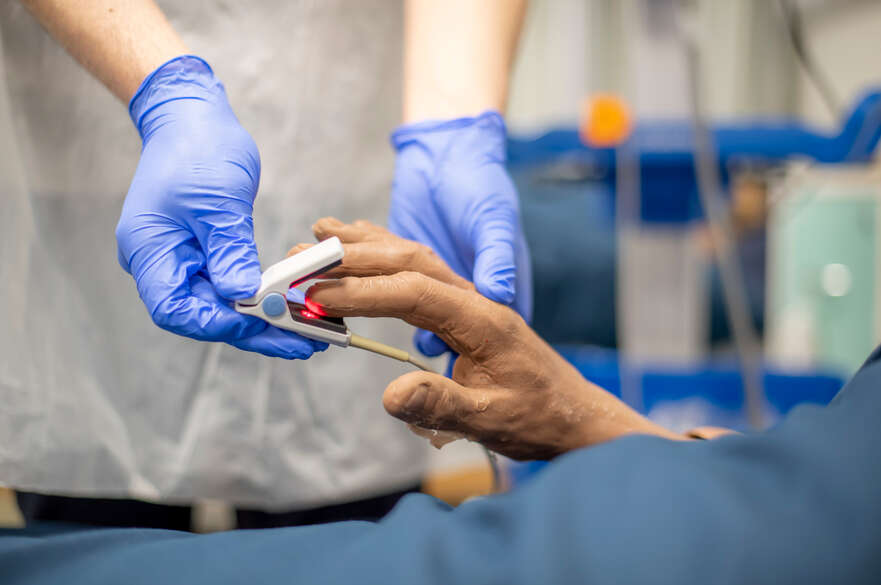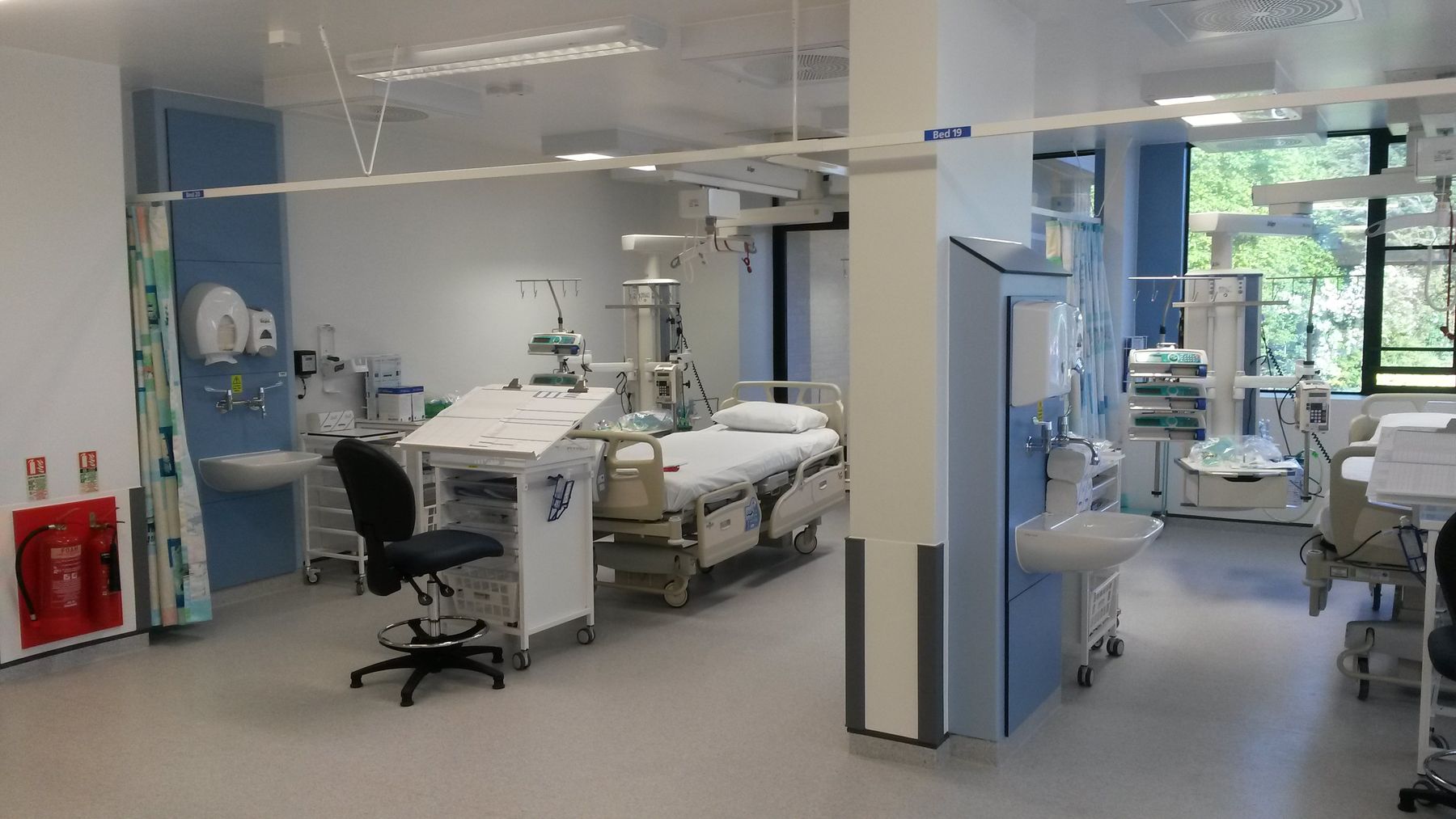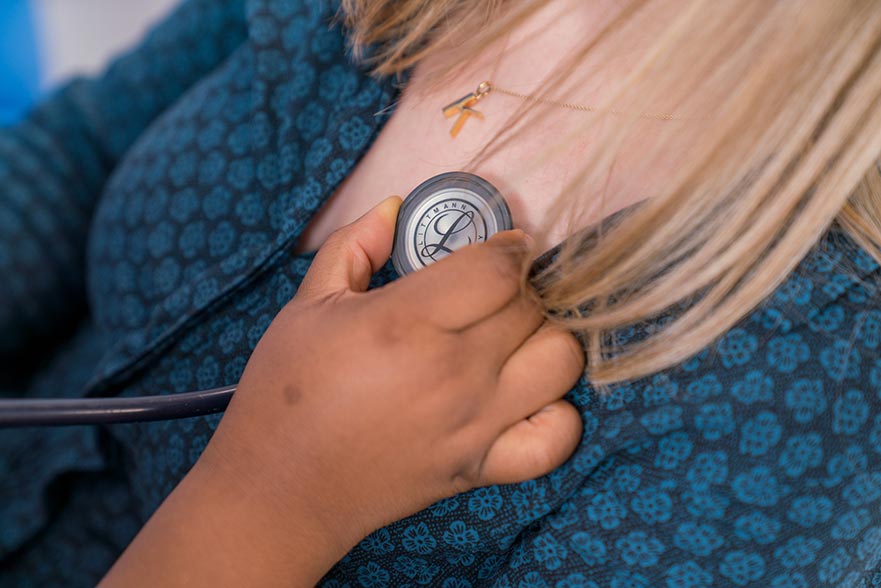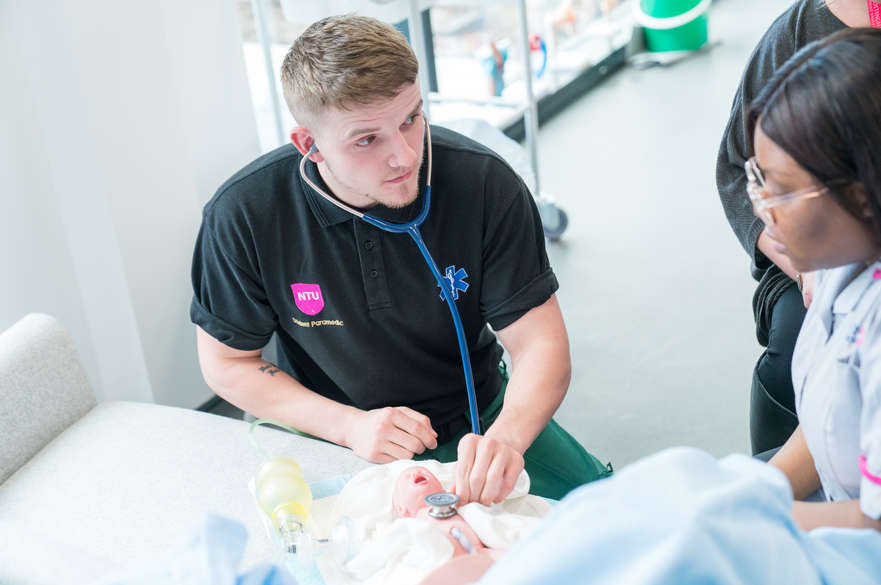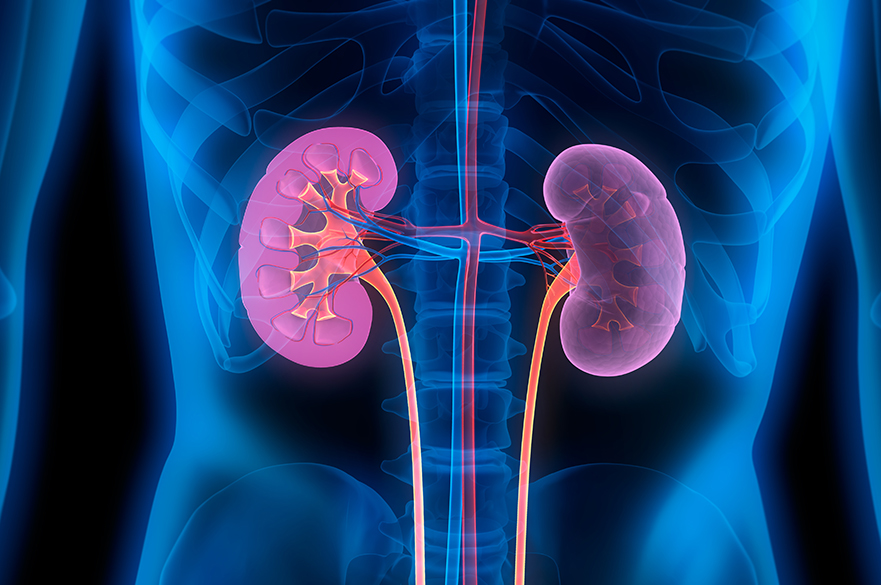Frailty BSc (Hons); Postgraduate Certificate in; Postgraduate Diploma in; MSc; Professional Certificate in
About this course
The Institute of Health and Allied Professions at NTU offers a comprehensive suite of continuous professional development (CPD) courses that have been designed and developed to meet the needs of the local health sector workforce.
This Frailty course provides post-registration continuing professional development for registered health professionals. This course contributes to developing practice excellence and the delivery of professional caring for people living with frailty. It aims to develop practitioners with a breadth of knowledge across all areas of the frailty speciality, who will be able to deliver evidence-based care to people living with frailty and their carers. This course has been developed in collaboration with Nottingham University Hospitals NHS Trust.
Why do this course?
-
Tailor your learning experience to suit your professional development needs, with a range of qualifications available at different levels.
-
Benefit from our collaborative course design with specialist colleagues from Nottingham University Hospitals (NUH) NHS Trust.
What you’ll study
The course offers a unique blend of evidence and contemporary clinical practice to support the development of knowledgeable frailty practitioners. Content includes critical appraisal of anatomy and pathophysiology to inform frailty care and therapeutic interventions, collaborative working and contemporary approaches to leadership. The course will encourage students to critically reflect on current practice, discuss underpinning research and professional guidance and debate case-studies to develop clinical expertise and inform clinical decision making.
The learning environment and level of teaching will be the same for each level of study (post registration certificate, (level 6) or postgraduate (level 7). The level of study and therefore attainment will be differentiated at assessment only, students will be assessed at either Level 6 or 7.
- Professional Certificate (Level 6)
- Postgraduate Certificate (Level 7)
- Postgraduate Diploma (Level 7)
- BSc
- MSc
Core modules
Understanding, Identifying, Assessing and Managing Frailty (30 credits)
This module aims to develop a critical understanding of the pathophysiology of aging, concepts of frailty and the comprehensive geriatric assessment. The module considers contemporary approaches to the assessment and management of people living with frailty including management of frailty syndromes, along with strategies to promote patient engagement and participation in self-management.
Maintaining Function and Quality of Life in the Frail Person (30 credits)
This module aims to develop a critical understanding of reablement, person centred care and the wider determinants of health. The module also considers contemporary approaches to leadership to facilitate effective collaboration and effective performance of the multidisciplinary team.
Core modules
Understanding, Identifying, Assessing and Managing Frailty (30 credits)
This module aims to develop a critical understanding of the pathophysiology of aging, concepts of frailty and the comprehensive geriatric assessment. The module considers contemporary approaches to the assessment and management of people living with frailty including management of frailty syndromes, along with strategies to promote patient engagement and participation in self-management.
Maintaining Function and Quality of Life in the Frail Person (30 credits)
This module aims to develop a critical understanding of reablement, person centred care and the wider determinants of health. The module also considers contemporary approaches to leadership to facilitate effective collaboration and effective performance of the multidisciplinary team.
Core modules
Research in Nursing, Health and Social Care (30 credits)
This module explores contemporary issues and debates in health research. The module will prepare students with the knowledge and skills required to undertake research in their chosen field of professional practice.
Understanding, Identifying, Assessing and Managing Frailty (30 credits)
This module aims to develop a critical understanding of the pathophysiology of aging, concepts of frailty and the comprehensive geriatric assessment. The module considers contemporary approaches to the assessment and management of people living with frailty including management of frailty syndromes, along with strategies to promote patient engagement and participation in self-management.
Maintaining Function and Quality of Life in the Frail Person (30 credits)
This module aims to develop a critical understanding of reablement, person centred care and the wider determinants of health. The module also considers contemporary approaches to leadership to facilitate effective collaboration and effective performance of the multidisciplinary team.
Optional modules (30 credits)
Leadership in Nursing, Health & Social Care Practice (30 credits)
The module will consider contemporary leadership theory, policy and research and will engage learners in critical reflection on their leadership approach. It aims to support you to develop a critical awareness of different leadership theories and styles, critically analyse the challenges facing leaders working in healthcare and/or social care environment, construct strategies to lead change and innovation in their local area, and consider the role of the leader in addressing resilience of self and colleagues in the healthcare and/or social care environment.
Independent and Supplementary Prescribing for Non-Medical Practitioners (40 credits)
This module will provide learners with the knowledge and skills required to meet the NMC and HCPC standards for Independent and Supplementary Prescribing for Non-medical prescribers. You will develop your skills to be able to assess, diagnose and prescribe for a range of conditions, be introduced to the knowledge and skills to work in partnership with other professionals to deliver evidence-based care in diverse health and social care settings, and be equipped with professional values and behaviours to demonstrate self-awareness, leadership and resilience.
Innovation in Nursing, Health and Social Care Practice (30 credits)
In this module you will explore creativity, innovation and entrepreneurial thinking in nursing, health and social care. You'll critically analyse approaches to creative problem solving, and you'll be equipped with the knowledge and skills needed to innovate in response to an ever-changing environment and associated challenges.
Fundamentals of Neonatal Care (30 credits)
In this module you will gain a critical understanding of anatomy and pathophysiology, which informs neonatal care and therapeutic interventions in the low dependency and special care settings. You will critically analyse research, evidence and professional guidance to inform family-centred care, and analyse leadership strategies which facilitate collaboration and the efficient use of resources for the effective performance of the team. You will critically appraise the psychosocial and cultural needs of the family unit in the neonatal setting, communicate knowledge & associated clinical reasoning to peers drawing on complex situations to synthesise decision making, develop therapeutic relationships between the family unit and the MDT, and develop critical reflective skills to enhance personal & professional development.
Fundamentals of Renal Care (30 credits)
This module aims to develop a critical understanding of acute kidney injury and chronic kidney disease. The module considers contemporary approaches to the assessment and management of renal conditions, along with strategies to promote patient engagement and participation in self-management.
Fundamentals in Acute Medicine and Emergency Care (30 credits)
This module will focus on the contemporary fundamental concepts in Acute Medicine and Emergency Care. Learners will develop their core knowledge and critical thinking skills within these specialities. Through a symptom-based focus with constant consideration of application to practice, learners will enhance clinical practice by improving their ability to assess patients and plan, manage and critically evaluate their care. This will be achieved through pre-learning, classroom-based, patient scenario, simulation-based activities and completion of a work based portfolio.
Developing Acute and Emergency Care (30 credits)
After completing the Fundamentals in Emergency and Acute medicine, learners on this module will focus on Developing Acute and Emergency Care. Emphasis will be placed on gaining the critical knowledge and enhanced skills required for developing expertise and confidence in this area. There will be a symptom based approach to the learning and focus on the continuing care of patients.
Contemporary Approaches in Renal Disease (30 credits)
This module aims to develop a critical understanding of active therapeutic interventions which are used in the management of renal pathology. The module also considers contemporary approaches to leadership to facilitate effective collaboration and effective performance of the multidisciplinary team.
Lifecycle of Clinical Research (30 credits)
This module aims to develop understanding of the practical and regulatory issues associated with carrying out health and social care related research. You’ll explore different types of research studies and their challenges, discuss research design and delivery including the importance of patient and public involvement, and learn how to identify funding and resource requirements.
Leading Health and Social Care Research (30 credits)
This module aims to help you understand the principles of planning, patient recruitment, piloting and feasibility assessments. You will explore how collaboration can enhance study feasibility and quality, appraise the attributes of an inclusive researcher, and develop a critical and reflective approach to leading and delivering health and social care research.
Trial Management (30 credits)
This module will equip you with the knowledge and skills to manage a research study, including project planning, resource management and risk management. Your skills and confidence to manage a clinical trial will be enhanced, and you will explore strategies that can be implemented to ensure strategies are completed on-time and within budget.
Research Governance (15 credits)
In this module you will review Good Clinical Practice (GCP) principles for conducting and reporting clinical trials. You will discuss quality assurance and quality control systems used for monitoring and audit, and learn to effectively prepare for an inspection.
Research Ethics (15 credits)
In this module you will develop an awareness of the key ethical issues in research, the role of ethics committees, and research governance. You will discuss how research ethics and research integrity protect the safety of research participants, and explore how to identify ethical issues across the design, delivery and management of research.
Core modules
Evidence in Clinical Practice (30 credits)
This module recognises the importance of clinical expertise as key to interpreting and applying research and professional evidence into practice. During this module students will learn how to find evidence and critically analyse theoretical, scientific and ethical aspects of their chosen sources. Students will consider how evidence can inform practice and make credible recommendations for change.
Understanding, Identifying, Assessing and Managing Frailty (30 credits)
This module aims to develop a critical understanding of the pathophysiology of aging, concepts of frailty and the comprehensive geriatric assessment. The module considers contemporary approaches to the assessment and management of people living with frailty including management of frailty syndromes, along with strategies to promote patient engagement and participation in self-management.
Maintaining Function and Quality of Life in the frail Person (30 credits)
This module aims to develop a critical understanding of reablement, person centred care and the wider determinants of health. The module also considers contemporary approaches to leadership to facilitate effective collaboration and effective performance of the multidisciplinary team.
Independent Study (30 credits)
This module provides you with the opportunity for originality and intellectual independence into a specific area of your practice. Students will be able to choose between an impact study (e.g. service evaluation or audit), a clinical change project, or critical review of practice.
Core modules
Research in Nursing, Health and Social Care (30 credits)
This module explores contemporary issues and debates in health research. The module will prepare students with the knowledge and skills required to undertake research in their chosen field of professional practice.
Understanding, Identifying, Assessing and Managing Frailty (30 credits)
This module aims to develop a critical understanding of the pathophysiology of aging, concepts of frailty and the comprehensive geriatric assessment. The module considers contemporary approaches to the assessment and management of people living with frailty including management of frailty syndromes, along with strategies to promote patient engagement and participation in self-management.
Maintaining Function and Quality of Life in the Frail Person (30 credits)
This module aims to develop a critical understanding of reablement, person centred care and the wider determinants of health. The module also considers contemporary approaches to leadership to facilitate effective collaboration and effective performance of the multidisciplinary team.
Independent Study (60 credits)
This module provides you with the opportunity for originality and intellectual independence into a specific area of your practice. Students will be able to choose between an impact study (e.g. service evaluation or audit), a clinical change project, or critical review of practice.
Optional modules (30 credits)
Leadership in Nursing, Health & Social Care Practice (30 credits)
The module will consider contemporary leadership theory, policy and research and will engage learners in critical reflection on their leadership approach. It aims to support you to develop a critical awareness of different leadership theories and styles, critically analyse the challenges facing leaders working in healthcare and/or social care environment, construct strategies to lead change and innovation in their local area, and consider the role of the leader in addressing resilience of self and colleagues in the healthcare and/or social care environment.
Independent and Supplementary Prescribing for Non-Medical Practitioners (40 credits)
This module will provide learners with the knowledge and skills required to meet the NMC and HCPC standards for Independent and Supplementary Prescribing for Non-medical prescribers. You will develop your skills to be able to assess, diagnose and prescribe for a range of conditions, be introduced to the knowledge and skills to work in partnership with other professionals to deliver evidence-based care in diverse health and social care settings, and be equipped with professional values and behaviours to demonstrate self-awareness, leadership and resilience.
Innovation in Nursing, Health and Social Care Practice (30 credits)
In this module you will explore creativity, innovation and entrepreneurial thinking in nursing, health and social care. You'll critically analyse approaches to creative problem solving, and you'll be equipped with the knowledge and skills needed to innovate in response to an ever-changing environment and associated challenges.
Fundamentals of Neonatal Care (30 credits)
In this module you will gain a critical understanding of anatomy and pathophysiology, which informs neonatal care and therapeutic interventions in the low dependency and special care settings. You will critically analyse research, evidence and professional guidance to inform family-centred care, and analyse leadership strategies which facilitate collaboration and the efficient use of resources for the effective performance of the team. You will critically appraise the psychosocial and cultural needs of the family unit in the neonatal setting, communicate knowledge & associated clinical reasoning to peers drawing on complex situations to synthesise decision making, develop therapeutic relationships between the family unit and the MDT, and develop critical reflective skills to enhance personal & professional development.
Fundamentals of Renal Care (30 credits)
This module aims to develop a critical understanding of acute kidney injury and chronic kidney disease. The module considers contemporary approaches to the assessment and management of renal conditions, along with strategies to promote patient engagement and participation in self-management.
Fundamentals in Acute Medicine and Emergency Care (30 credits)
This module will focus on the contemporary fundamental concepts in Acute Medicine and Emergency Care. Learners will develop their core knowledge and critical thinking skills within these specialities. Through a symptom-based focus with constant consideration of application to practice, learners will enhance clinical practice by improving their ability to assess patients and plan, manage and critically evaluate their care. This will be achieved through pre-learning, classroom-based, patient scenario, simulation-based activities and completion of a work based portfolio.
Developing Acute and Emergency Care (30 credits)
After completing the Fundamentals in Emergency and Acute medicine, learners on this module will focus on Developing Acute and Emergency Care. Emphasis will be placed on gaining the critical knowledge and enhanced skills required for developing expertise and confidence in this area. There will be a symptom based approach to the learning and focus on the continuing care of patients.
Contemporary Approaches in Renal Disease (30 credits)
This module aims to develop a critical understanding of active therapeutic interventions which are used in the management of renal pathology. The module also considers contemporary approaches to leadership to facilitate effective collaboration and effective performance of the multidisciplinary team.
Lifecycle of Clinical Research (30 credits)
This module aims to develop understanding of the practical and regulatory issues associated with carrying out health and social care related research. You’ll explore different types of research studies and their challenges, discuss research design and delivery including the importance of patient and public involvement, and learn how to identify funding and resource requirements.
Leading Health and Social Care Research (30 credits)
This module aims to help you understand the principles of planning, patient recruitment, piloting and feasibility assessments. You will explore how collaboration can enhance study feasibility and quality, appraise the attributes of an inclusive researcher, and develop a critical and reflective approach to leading and delivering health and social care research.
Trial Management (30 credits)
This module will equip you with the knowledge and skills to manage a research study, including project planning, resource management and risk management. Your skills and confidence to manage a clinical trial will be enhanced, and you will explore strategies that can be implemented to ensure strategies are completed on-time and within budget.
Research Governance (15 credits)
In this module you will review Good Clinical Practice (GCP) principles for conducting and reporting clinical trials. You will discuss quality assurance and quality control systems used for monitoring and audit, and learn to effectively prepare for an inspection.
Research Ethics (15 credits)
In this module you will develop an awareness of the key ethical issues in research, the role of ethics committees, and research governance. You will discuss how research ethics and research integrity protect the safety of research participants, and explore how to identify ethical issues across the design, delivery and management of research.
We regularly review and update our course content based on student and employer feedback, ensuring that all of our courses remain current and relevant. This may result in changes to module content or module availability in future years.
How you're taught
Teaching will be delivered using a variety of approaches, which include, lectures, problem-based learning, collaborative learning and reflection on clinical practice.
The course is delivered through in-person taught days at our Clifton Campus and supported by online resources on the NTU Online Workspace (NOW).
This course is co-delivered by experienced academics and specialist staff embedded in current frailty clinical practice. This offers a synergistic approach to course delivery to ensure that the course remains current and responsive to changes in current practice. Students have the opportunity to develop knowledge and skills across a range of frailty contexts and apply learning to practice through critical reflection and discussion of practice.
Clinical area
Students should work within an appropriate health or social care setting while studying this course. This will enable students to reflect on their current practice and apply the knowledge and skills that are learned throughout the course. The course will also use case studies relating to the specialty and workplace along with discussion of professional practice to facilitate the integration of theory and practice.
How you're assessed
Professional / Postgraduate Certificate in Frailty
- OSCE
- Presentation
- Written assignment
BSc Frailty
- Critical review of literature
- Presentation
- Written assessment
- OSCE
- Project report
MSc Frailty
- Research proposal
- Presentation
- Written assessment
- OSCE
- Project report
Campus and facilities
The purpose-built Health & Allied Professions (HAP) Centre is home to our world-class teaching, practice, research and scholarship in the Institute of Health and Allied Professions (IHAP).
Our self-contained, community-focused Clifton Campus has been designed to keep our students busy between lectures. Catch-up with your coursemates in the Pavilion’s barista café and Refectory; brainstorm group presentations in chic and stylish study spaces; enjoy some proper R&R in The Point, home of our Students’ Union. The campus also hosts the multimillion-pound Clifton Sports Hub, offering great options for everyone — whatever your interests, and however competitive you’d like to get!
You’re also right next to the bright lights of Nottingham — one of Britain’s top 10 student cities, and one of Europe’s top 25. All through termtime, a dedicated on-campus bus service will get you to the heart of the action (and back) in under 25 minutes. You’ll find a city stuffed with history, culture, and well-kept secrets to discover at your leisure: enjoy lush green spaces, galleries, hidden cinemas and vintage shopping by day, and an acclaimed food, drink and social scene by night.
Take our virtual tour to get a real feel for the campus.
Entry requirements
Professional / Postgraduate Certificate in Frailty
- Applicants will be registered nurses currently working in an area of practice which is pertinent to the course
- Applicants for the Professional certificate must have a level 5 qualification, applicants for the Post graduate certificate must have a level 6 qualification or evidence of the ability to study at Level 6
BSc Frailty
- Applicants will be registered health practitioners currently working in health or social care.
MSc Frailty
- Applicants will be registered health practitioners currently working in health or social care.
- Level 6 qualification or evidence of the ability to study at level 7
Getting in touch
If you need more help or information, get in touch through our enquiry form
Fees and funding
Fees for 2025 entry
| Level of study | Course cost |
|---|---|
| ProfCert and PGCert | £2,700 |
| BSc | £5,000 |
| MSc | £8,100 |
*Please note that if you are considering a course that runs over more than one year, the tuition fee stated is for the first year of study. The course fee for the second year may be subject to annual review.
Getting in touch
For more advice and guidance, you can contact our Student Financial Support Service.
Tel: +44 (0)115 848 2494
How to apply
Ready to join us? Then apply as soon as you can.
Download and complete our application form and return it to SOC.cpd@ntu.ac.uk. Please make sure you have read through the above course entry requirements carefully before you do.
Keeping up to date
After you have applied, we will be sending you important emails throughout the application process - so check your emails regularly, including your junk mail folder. You can get more information and advice about applying to NTU in our postgraduates’ guide.
Good luck with your application!
Please read our notes on the University's commitment to delivering the educational services advertised.
